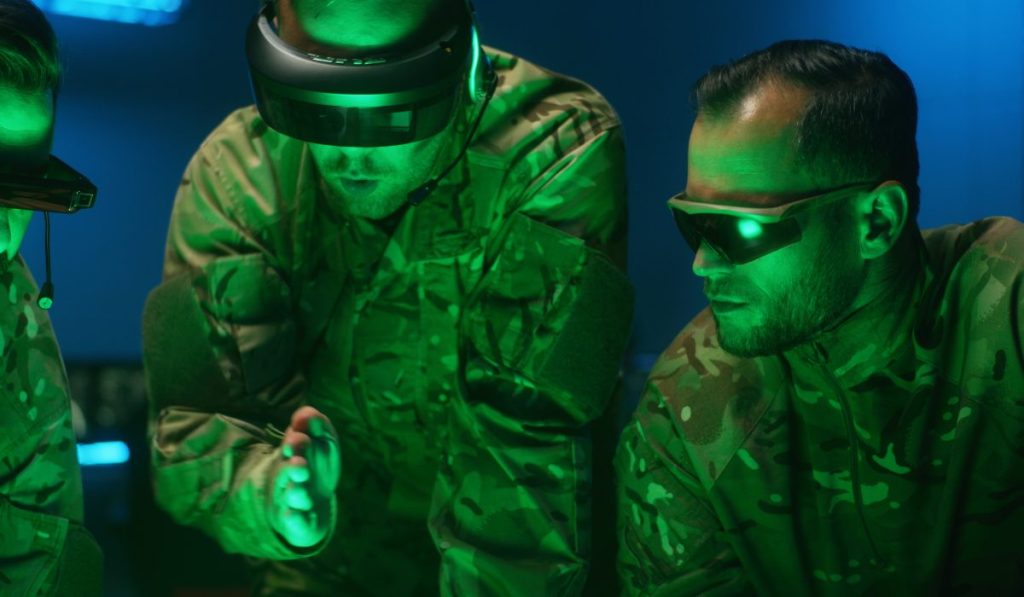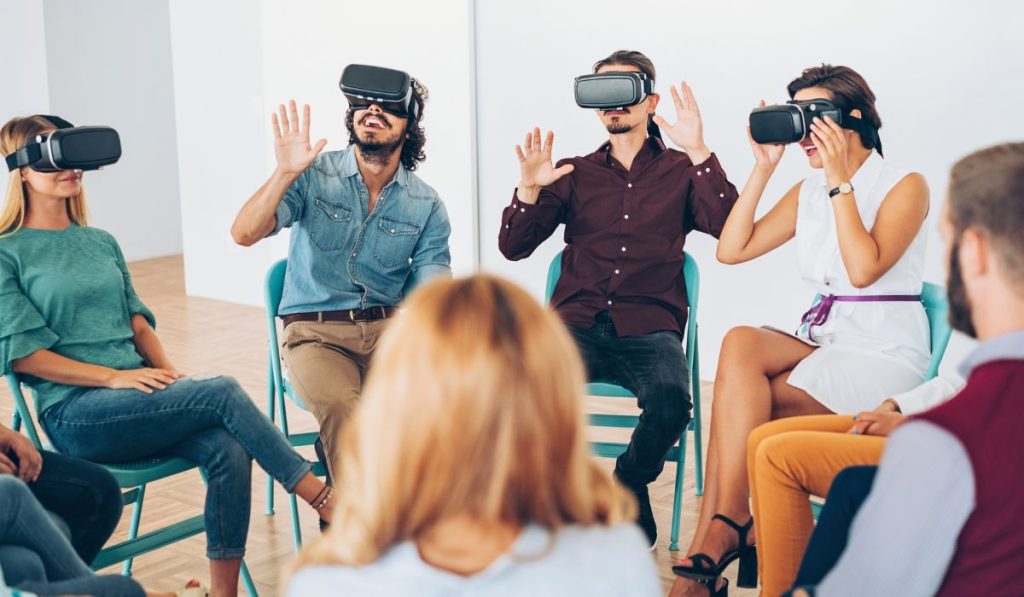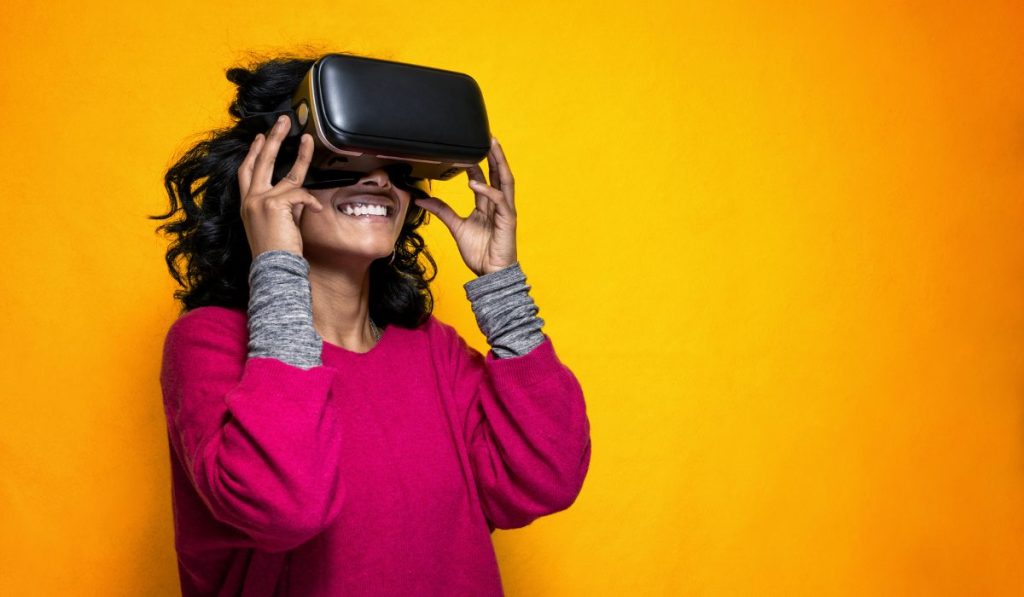As we explore the role of virtual reality in training, it’s crucial to recognize its transformative potential in revolutionizing employee development. Virtual reality (VR) has emerged as a powerful tool for accelerating skill acquisition and enhancing soft skills among employees across various industries.
In this blog post, we’ll explore how virtual reality training provides realistic job simulations that enable faster learning, such as Mursion’s 2D call center agent training programs. Additionally, we’ll discuss the significance of fostering inclusive leadership through neurodiverse-friendly VR coaching sessions.
Furthermore, with an increasing emphasis on diversity, equity, and inclusion (DEI) initiatives within organizations worldwide, understanding the role of virtual reality in training becomes even more vital. Also, we’ll examine the growing importance of immersive experiences for soft skills training and how simulation-based learning can boost productivity by keeping learners engaged and focused.
Last but not least, our exploration would be incomplete without highlighting successful virtual environment implementations across different sectors and discussing future prospects – including potential benefits for police departments and offshore industries.
Accelerating Skill Development with VR Training
Virtual reality training is a game-changer for building confidence, empathy, and competency in the real world. By immersing learners in highly realistic job simulations, the use of VR allows them to develop essential skills at an accelerated pace. For instance, the use of Mursion’s 2D simulations trained new employees during the pandemic.
- Realistic job simulations for faster learning: With immersive environments that mimic real-world scenarios, employees can quickly adapt and learn from their VR training experiences.
- Mursion’s 2D simulations for call center agent training: This innovative approach helped companies maintain high-quality customer service while keeping employees safe during COVID-19 restrictions.
VR training is a powerful tool for accelerating skill development. By providing learners with realistic simulations, they can gain hands-on experience and build confidence in their abilities.
And this approach has been particularly effective in industries such as healthcare, where VR simulations have been used in medical training for surgeons and healthcare professionals.
Benefits of VR Training
- Improved retention: VR training sessions allow learners to experience situations in a way that is memorable and engaging, leading to better retention of information.
- Cost-effective: Virtual simulations can be a more cost-effective way to train new hires than traditional training methods. Furthermore, it eliminates the need for expensive equipment and materials.
- Safe and controlled environment: VR simulations provide a controlled and safe environment for learners to practice and make mistakes without any real-world consequences. Further, a simulated environment allows employees to practice and improve in skills such as conflict resolution and public speaking.
- Measurable results: VR training allows for data collection and analysis, providing insights into employee performance and areas for improvement.
- Boost productivity: Simulation-based learning through VR offers emotionally engaging content that keeps today’s impatient, distracted learners focused and productive without sacrificing quality.
- Wide range of applications in different scenarios and workplaces: Metaverse technologies are predicted to reach $20 billion soon, offering opportunities across sectors such as healthcare or pilot markets (source). And virtual reality is revolutionizing how we learn and train across multiple fields, from surgical training to pilots perfecting flight maneuvers and even military training.
Related: How to Overcome Laziness and Procrastination Effectively

Successful VR Training Implementations and Future Prospects
Various industries have embraced VR training programs with great success. McDonald’s, Verizon, DyeMansion, Siemens, and New Holland Agriculture are just a few examples of companies that have implemented virtual reality for employee training. Also, even Victoria University is exploring its potential in education.
But the potential of VR training goes beyond these examples. Police departments and the offshore industry could also benefit from this innovative technology.
The Growing Importance of Soft-Skills Training in VR
As artificial intelligence takes over manual repetitive tasks within jobs and companies merge with others, the value of soft-skills training increases significantly. Cornell Verdeja-Woodson believes that diversity equity inclusion (DEI) initiatives can benefit from immersive experiences provided by virtual reality technology.
- Emphasis on DEI initiatives through immersive experiences: Virtual reality allows users to experience different perspectives and situations, fostering empathy and understanding among diverse groups.
- Increasing demand for soft-skills development: As the workforce evolves, businesses recognize the need for employees to develop strong communication, collaboration, and problem-solving skills. And VR offers an engaging platform for this growth.
Soft-skills training is becoming increasingly important in today’s workforce, and virtual reality is the future of delivering this training. VR can provide an engaging atmosphere and realistic scenarios to help staff hone the aptitudes they need for career success.
Related: What is Neurodiversity?

Enhancing Inclusive Leadership Skills through VR
Not surprisingly, virtual reality training has proven to be a highly effective method for developing inclusive leadership skills. A 2023 study found that using VR to train PwC managers in these skills helped them learn faster and retain more information than classroom learners – nearly twice as fast as e-learners.
Flanagan Leadership Group offers virtual reality coaching sessions that are friendly for neurodiverse individuals, emphasizing its potential impact on leadership training and business coaching.
Neurodiverse-Friendly Coaching Sessions
VR coaching sessions with Flanagan Leadership Group are designed to be inclusive and accessible for individuals with diverse learning styles and abilities. Plus, this technique promotes a more equitable and encouraging atmosphere, potentially resulting in enhanced outcomes for all involved.
Additionally, by leveraging the power of VR technology, organizations can enhance their leadership development programs and create more inclusive and effective teams.
Related: Can Virtual Reality VR Have an Impact on Autism Therapy
Conclusion
So, what’s the deal with virtual reality in training? In a nutshell, training in a virtual space is a valuable tool for accelerating skill development in various industries. By providing learners with realistic simulations, they can gain new skills in a safe space and build confidence in their abilities.
As the VR training technology continues to progress, there will continue to be even more imaginative uses in different workplace scenarios.
In addition, the VR environment offers neurodiverse-friendly coaching sessions that help learners improve their soft-skills while retaining information faster than traditional methods. VR training works by creating an immersive learning experience that promotes empathy and understanding among team members.
In today’s fast-paced and constantly evolving work environment, investing in virtual reality training programs and coaching sessions from Flanagan Leadership Group can be an effective way to stay ahead of the curve. By providing your workforce with cutting-edge tools and resources, you can empower them to enhance their skills, boost productivity, and drive organizational success.
With all of this in mind, we highly recommend considering a VR training program or coaching sessions from Flanagan Leadership Group for your workplace.
Click here to book a free consultation to learn more about how Flanagan Leadership Group can help you enhance your team’s skills and grow your business with our innovative VR training and coaching solutions.


